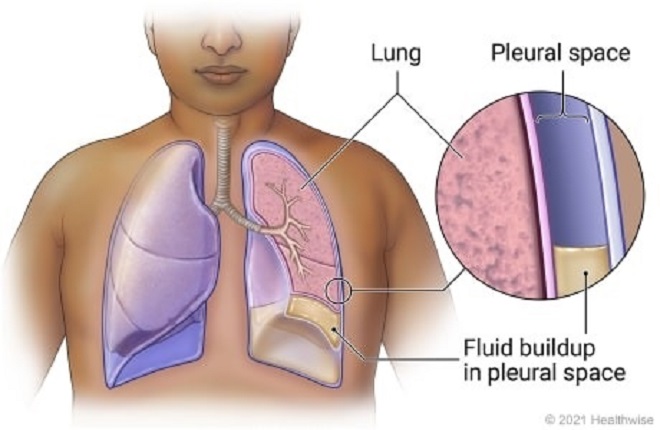
Expert Care for Pleural Effusion at Care Super Speciality Hospital
With the increasing prevalence of respiratory conditions, it is crucial to understand and address pleural effusion effectively. Welcome to Care Superspeciality Hospital's comprehensive guide on pleural effusion. Pleural effusion, or "water on the lungs," is where excess fluid builds up in the pleural cavity, the space between the layers of tissue lining the lungs and the chest cavity. This fluid accumulation can cause breathing difficulties and other symptoms and may indicate underlying health issues. Dr. Ankur Mehta, the best pulmonologist, provides expert diagnosis and treatment to manage and alleviate pleural effusion effectively. Here, under the expert guidance of Dr. Ankur Mehta, we provide you with essential information about the causes, symptoms, and treatments for this condition, empowering you to make informed decisions about your health.
Causes of Pleural Effusion
Understanding the underlying causes of pleural effusion is essential for effective treatment and management. Various medical conditions can lead to the development of pleural effusion, each impacting the body differently.
Pleural effusion can be caused by a variety of conditions, including:
- Tuberculosis
- Heart Failure
- Pneumonia
- Lung Cancer
- Pulmonary Embolism
- Liver Disease
- Kidney Disease
- Autoimmune Disease
Symptoms of Pleural Effusion
Recognizing the symptoms of pleural effusion early can lead to timely and effective treatment. The severity and nature of symptoms can vary widely based on the cause and the volume of fluid accumulated in the pleural cavity.
The symptoms of pleural effusion can vary depending on the underlying cause and the amount of fluid present. Common symptoms include:
- Shortness of breath
- Chest pain, especially when breathing deeply or coughing
- Cough
- Fever (if infection is present)
- Hiccups
- Difficulty breathing when lying down
Diagnosis of Pleural Effusion
Accurate diagnosis is crucial for determining the appropriate treatment for pleural effusion. A comprehensive evaluation typically includes a combination of physical examinations and diagnostic tests to identify the underlying cause and severity of the condition.
Diagnosing pleural effusion involves several steps:
- Physical Examination
- Imaging Tests
- Thoracentesis
- Blood Tests
Treatment of Pleural Effusion
Effective treatment of pleural effusion focuses on addressing both the symptoms and the underlying cause of the fluid buildup. The chosen treatment approach can vary significantly based on the severity of the effusion and the patient's overall health.
Treatment for pleural effusion depends on the underlying cause and the severity of the condition:
Thoracentesis
Removing fluid from the pleural space can relieve symptoms and provide a sample for diagnosis.
Medication
Antibiotics for infections, diuretics for heart failure and anti-inflammatory drugs for autoimmune conditions can help manage the underlying cause.
Chest Tube
A chest tube may be inserted to drain fluid continuously in cases of large or recurrent effusions.
Pleurodesis
A procedure that involves injecting a substance into the pleural space to prevent fluid buildup in chronic cases
Surgery
In severe cases, surgical options like pleurectomy or shunt placement may be necessary.
When to Seek Immediate Medical Attention
It is important to contact your healthcare provider immediately if you experience any of the following symptoms, as they may indicate a serious complication:
- Cyanosis: A bluish tint to your lips or fingernails can indicate insufficient oxygen levels in your blood.
- Hemoptysis or Discolored Mucus: Coughing up blood or mucus that is yellow, green, or grey. Severe or Worsening Pain: Persistent pain or pain that intensifies over time.
- Respiratory Distress: Significant difficulty breathing or shortness of breath.
- Dizziness and Concentration Issues: Feeling faint, dizzy, or having trouble concentrating. Fever: A high temperature that may suggest an infection.
Why Choose Care Super Speciality Hospital For Pleural Effusion?
Dr. Ankur Mehta’s Expertise
Renowned pulmonologist Dr. Ankur Mehta ensures high-quality care and optimal outcomes for respiratory challenges.
Cutting-edge Technology
We use state-of-the-art technology for precise diagnosis and treatment, setting the standard in Vadodara.
Personalized Treatment
Dr. Mehta crafts custom treatment plans based on advanced diagnostics to meet your unique needs.
Complete Support
We provide comprehensive support throughout your treatment journey and beyond.
Schedule Your Pleural Effusion Appointment in Vadodara
If you are experiencing symptoms of pleural effusion or have been diagnosed with this condition, consult Dr. Ankur Mehta at Care Super Speciality Hospital. With his expertise in pulmonology, Dr. Mehta provides comprehensive care and personalized treatment plans to manage pleural effusion effectively.
For more information or to book an appointment, please contact us at (0265) 241 4663.
Patients Testimonials
“Dr. Ankur always goes above and beyond to help his patients. I was admitted to his hospital for acute lung inflammation. His personalized care and early diagnosis helped me to recoup fast.”.
“After a sudden asthma attack, I was admitted to Care Super Specialty Hospital. It was an emergency, but Dr. Ankur Mehta and his team took specialized care. I was administered proper medication and kept under his care until I recouped.”
“Dr. Ankur conducted proper tests to identify my interstitial lung disease. I had a good experience, as the personalized care under him helped me recoup fully. I would recommend his clinic to everyone.”
News

Tuesday 13, August 24 | Care
Therapeutic Bronchoscopy: Advancements in Treating Lung Diseases

Monday 12, August 24 | Care
Bronchoscopy: How This Essential Procedure Helps Diagnose Lung Conditions

Saturday 10, August 24 | care
The Role of Pulmonary Function Tests in Managing Chronic Respiratory Diseases
